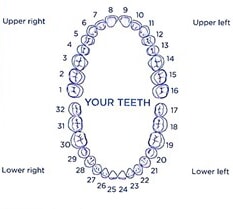Preventative
Q: I Brush My Teeth Regularly. Do I Really Need to Floss as Well?
A: Yes. Plaque, a sticky film of bacteria covering your teeth, can build up on all the surfaces of your teeth – especially the surfaces between your teeth. Flossing helps reduce plaque buildup and prevent cavities in places where your toothbrush can’t reach.
Q: What’s the Difference between a Resin Composite Filling and a Dental Amalgam Filling?
A: Composite fillings are tooth-colored and are usually preferred by patients for cosmetic reasons. They are less durable than amalgam but are effective for small and midsize fillings. Amalgam fillings are made of a metal alloy mixture containing powdered silver, tin, copper and liquid mercury. They are safe, affordable, and durable, but they are silver colored and do not match the tooth.
Q: What’s the Proper Way to Brush My Teeth?
A: Brush at least twice a day for at least two minutes, spending one minute on the top teeth and one minute on the bottom teeth. Use a soft-bristled toothbrush that properly fits your mouth and reaches all areas. Always use fluoride toothpaste. When brushing, hold your toothbrush at a 45° angle to your gums. Use short, tooth-wide strokes and gently brush back and forth over the tooth. Brush all areas of the tooth, including the outer and inner surfaces of the teeth and the chewing surfaces. Brush your tongue as well to remove bacteria there. Replace your toothbrush every 3 or 4 months, or as soon as the bristles become frayed or matted.
Q: How Should I Take Care Of My Teeth between Visits to the Dentist?
A: Brush twice daily for at least two minutes and floss between your teeth once a day. Limit your intake of sugar, tobacco, and alcohol.
Q: How Often Should I Replace My Toothbrush?
A: Replace your toothbrush at least every 4 months, or as soon as the bristles start to fray. An old toothbrush will be ineffective at cleaning and can damage your gums.
Q: What Causes Cavities?
A: Cavities are caused by plaque, which is a bacteria that eats sugar and leftover food on your teeth. As plaque builds up on your teeth, it produces an acid that eats through the enamel surface that protects your teeth. This creates tiny openings in the tooth surface. This opening is called a cavity. The acid from bacteria then begins to attack the next layer of the tooth, the dentin. Untreated, a cavity can attack each layer of the tooth, eventually reaching the soft tissue of the gums and causing infection. Many cavities cause no symptoms until they cause infection, so visiting the dentist twice a year is essential for treating cavities early.
Q: What Is Gum Disease?
A: Gum disease, or periodontal disease, occurs when the tissues surrounding the teeth become infected. The mildest form of gum disease, known as gingivitis, occurs when bacteria from plaque causes inflammation in the gums. When left untreated, gingivitis advances into periodontitis, a much more serious form of gum disease that can lead to tooth loss.
Q: My Teeth Feel Fine. Do I Still Need to See a Dentist? How Often?
A: Visit your dentist at least twice a year, even if you don’t notice or experience any problems. Many oral health problems cause no symptoms until they are serious. Your dentist is trained to detect problems early, when they are easier to treat.
Back to top
Restorative
Q: What’s the Difference between a Cap and a Crown?
A: There is no difference. A “cap” is a term often used to refer to a crown because of the way the crown “caps” a damaged tooth to restore its former size and shape.
Q: What Is a Dental Implant?
A: A dental implant is an artificial root inserted into the jaw to hold an artificial tooth or bridge after tooth loss.
Q: How Can I Replace Missing Teeth?
A: There are three options for missing tooth replacement: dental implants, removable partial dentures or fixed bridges. Removable dentures are the most affordable, but they are less convenient. Implants and fixed bridges function similarly to real teeth. Implants are the most durable and can last for decades if properly maintained.
Q: I Knocked Out a Tooth. Can It Be Saved?
A: It’s possible to save a tooth that’s been knocked out, but it requires immediate treatment. Call your dentist immediately to schedule an emergency appointment, ideally within 30 minutes of the traumatic incident. If possible, rinse the tooth with water if needed and place it back in position in your mouth to preserve it. If it can’t be positioned in its socket, hold it in the mouth next to the cheek, or place it in milk. In some cases, the tooth can be saved even after an hour or more, so get to your dentist as fast as possible for the best chance at saving the tooth.
Back to top
Cosmetic
Q: Does “Bleaching” My Teeth Make Them Sensitive?
A: Teeth whitening can cause increased sensitivity after a treatment. Peroxide, one of the ingredients in whitener, can seep through the enamel of your tooth to the softer dentin layer, irritating the nerve of the tooth. This sensitivity is usually temporary. However, overusing whitener can damage your gums and your tooth enamel, so follow the instructions regarding frequency of use, and consult your dentist before using a home whitening treatment.
Q: Are Home Whitening Products as Good As Dental Whitening Procedures?
A: Home whitening products are effective, but they are milder than the products used in a dental office. Home whitening usually requires more time and repeated use to see results. Our in-office tooth whitening will give you dramatic results in just one session that last longer than home whitening. Since different whitening methods are more effective for different types of discoloration, your dentist can choose the best products for your teeth.
Q: What Can I Do about Discolored Teeth?
A: Teeth can become discolored due to aging, food, or medications. The discoloration usually appears yellow, brown or gray. Depending on the cause of discoloration, you may be a candidate for a tooth whitening treatment. If you are considering an over-the-counter whitening product, always consult your dentist about tooth whitening, since not all types of tooth discoloration will respond to bleaching. Your dentist can determine if you’re a candidate for whitening, and they can perform the treatment in office.
Q: What Are Porcelain Veneers and How Can They Improve My Smile?
A: Porcelain veneers are thin layers of porcelain molded to fit over the surface of a tooth. They can improve the appearance of your teeth by covering imperfections such as a chip, spacing or discoloration.
Q: How Can Aesthetic Dentistry Improve the Appearance of My Teeth?
A: Aesthetic, or cosmetic, dentistry focuses on restoring or improving the appearance of your smile using techniques such as dental implants, orthodontics and periodontal plastic surgery. Teeth whitening, porcelain veneers and dental bridges are other common methods of aesthetic dentistry. Some procedures are purely cosmetic; others are used to treat a health issue such as tooth decay while also improving appearance.
Pediatric
Q: What Age Should My Child Visit the Dentist for the First Time?
A: The recommended age to bring a child to the dentist for the first time is age 1, or 6 months after the eruption of the first tooth. Early visits are an opportunity for your child to become comfortable visiting the dentist, to discuss good hygiene habits, and to build a foundation for your child to have a lifetime of good oral health. Introducing your child to a pediatric dentist early also means you’ll have the resources you need in the event of an emergency such as dental trauma from a fall.
Q: Is Thumbsucking or Pacifier Use Harmful to My Child’s Teeth?
A: Thumbsucking and pacifier use are not harmful for babies or toddlers. However, these habits can affect tooth alignment if they continue after age three. If your child is practicing extended pacifier use or thumbsucking, your pediatric dentist may recommend a mouth appliance or other treatment to reduce the habit.
Q: How Often Should My Child Visit a Pediatric Dentist?
A: Just like adults, children should visit the dentist every six months. Your child’s dentist may recommend a different frequency depending on your child’s oral health.
Q: How Should I Clean My Baby’s Teeth?
A: A small, soft-bristled toothbrush is suitable for infants, although a toothbrush designed specifically for infants is your best choice.
Q: What Are Dental Sealants and How Do They Work?
A: Dental sealants are protective coatings placed on the chewing surface of teeth to protect teeth from tooth decay. They work by covering crevasses in the chewing surface to keep bits of food from getting stuck in the tooth.
Q: Will Sealants Replace Fluoride for Cavity Protection?
A: No, fluoride provides a different type of protection than sealants. protects teeth from cavities differently than sealants. Sealants and fluoride will work together to protect teeth from cavities.
Invisalign and Orthodontics
Q: Why Are Straight Teeth Important?
A: In addition to improving the appearance of your smile, straight teeth promote better oral health. Crooked teeth are more difficult to clean, which can result in cavities, gum disease or even tooth loss.
Q: If I Have Braces and I’m Visiting the Orthodontist Regularly, Do I Also Need Dental Checkups Every Six Months?
A: Yes. Your dentist is still your primary oral health care provider and will check for changes in your mouth and gums such as mineral loss in your enamel, signs of gum disease, and indications of tooth decay.
Q: Will My Teeth Naturally Straighten as I Grow?
A: Your teeth will not straighten on their own. There are several treatment options that will straighten your teeth, including braces and aligners.
Q: Am I Too Old for Orthodontic Treatment?
A: You’re never too old! You can receive orthodontic treatment at any age. The overall health of your teeth and gums will determine whether you’re a good candidate for orthodontic care.
Q: How Long Will I Need to Wear Braces?
A: Your treatment plan will depend on your individual situation. Most people wear braces for one to three years.
Back to top
Urgent Dental Care
Q: What is Urgent Dental Care?
A: Urgent dental care addresses serious dental conditions that are not life-threatening but do need immediate treatment. If you experience an urgent dental condition, call us immediately at 855-750-5011 to schedule an emergency dental appointment.
Q: What Is a Dental Emergency?
A: In March 2020, the American Dental Association released guidelines for emergency and urgent dental care. The ADA defines a dental emergency as a life-threatening situation involving severe bleeding, life- threatening infection, or compromise of the airway. Dental emergencies can impact breathing because of swelling in the jaw and throat from a serious infection or because of traumatic injury affecting the bones around the airway.
Q: How Do I Know if My Dental Condition is Urgent and Needs Immediate Treatment?
A: Any condition that causes significant pain or swelling in the teeth, mouth or gums is an urgent dental condition that needs immediate treatment. Examples of conditions requiring urgent dental care include a broken or knocked out tooth, a broken crown or bridge if the gum beneath is irritated or inflamed, an orthodontic wire or appliance that is piercing the gum, or a large cavity that is causing severe pain.
Q: What Should I Do if I Need Urgent Dental Care?
A: If you need urgent dental care, call us at 855-750-5011 to schedule immediate treatment. For any life-threatening emergency, call 911 immediately.
Back to top
Routine Dental Care
Q: What Dental Problems are not Considered Urgent?
A: In addition to routine biannual checkups, many dental situations are not urgent and do not require immediate treatment. Examples include broken dentures, a broken bridge or crown that is not painful, routine orthodontic appointments such as tightening braces, and cosmetic dental procedures.
Q: What Happens if I Delay Routine Dental Care?
A: In most cases, delaying routine care will not cause the situation to become urgent. As long as you are not experiencing pain or irritation, it’s ok to delay treatments such as crown replacements or orthodontic adjustments. However, delaying your routine checkups can mean that asymptomatic cavities will continue to grow, which could eventually become painful and urgent. Don’t forget that staying current with your routine visits helps prevent the advancement of gum disease; which is connected to serious health conditions such as diabetes, cardiovascular disease, stroke and Alzheimer’s.
Q: What Should I Do if I Need Routine Dental Care?
A: If you are due for routine care, contact us to schedule an appointment when it’s convenient for you.
Q: What Is a Root Canal?
A: Root canals are used to treat infected or exposed vital (nerves and blood vessels) tissues of the teeth located in the root to relieve pain and make them healthy again. You may need a root canal if you have a significantly cracked tooth, a cracking filling, or a deep cavity. During a root canal procedure, inflamed or infected pulp (the soft tissue inside the tooth) is removed, carefully cleaned, and shaped for the inside of the root canal space, then filled and sealed, and restored with a crown for function and esthetics.
Periodontics
Q: What Is a Deep Cleaning (Scaling and Root Planing)?
This therapeutic gum procedure removes plaque and tartar buildup above and deep below the gumline. Deep cleanings are often necessary once a patient begins to experience moderate to severe periodontal (gum disease). Once the initial treatment phase is completed, it is essential that a regimen of maintenance visits are indicated.
Q: What Are Periodontal Measurements?
Also called periodontal/gum pockets, this measurement checks the depths of the spaces surrounding the tooth and root structure under the gumline. Deep periodontal pockets are a symptom of periodontitis (advanced gum disease), and left untreated, the condition can cause tooth loss. You can prevent your periodontal pockets from becoming deeper by seeing your dentists for proper evaluation and diagnosis of your oral health. Following the recommended therapy to treat the condition, routine maintenance is indicated to prevent further advancement of the disease process.
Q: What Is a Debridement?
Debridement is recommended to remove excessive tartar buildup above the gumline that interferes with the dentist’s ability to perform a comprehensive oral examination. Ultrasonic scaler will be used to remove tartar buildup and remove stains from tooth surfaces.
Q: What Is Tooth Number Mapping?
Each tooth you have has a corresponding number universal to all dentists (the Universal Numbering System) supported by the American Dental Association (ADA). Additionally, the teeth are mapped into quadrants. The numbering system allows for all 32 teeth, including the wisdom teeth, to be present. This helps dentists easily discuss treatment both with other specialists and your insurance company.

Back to top




